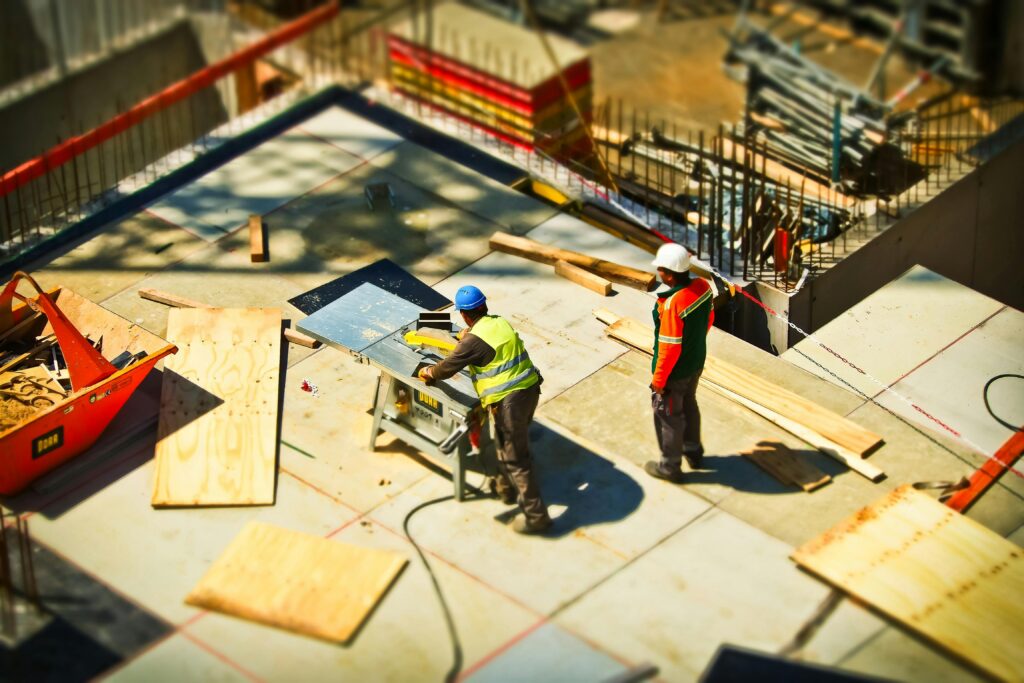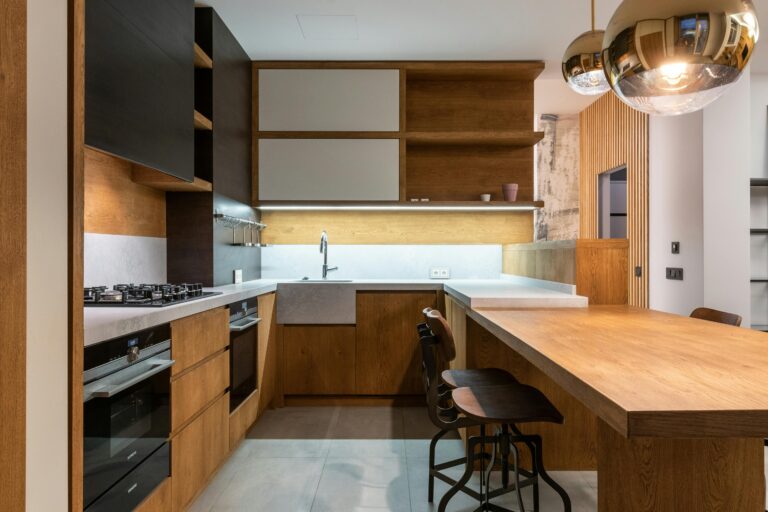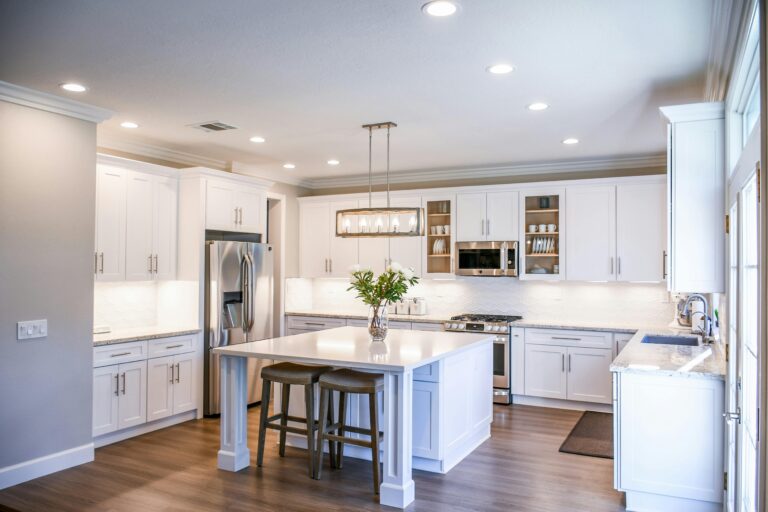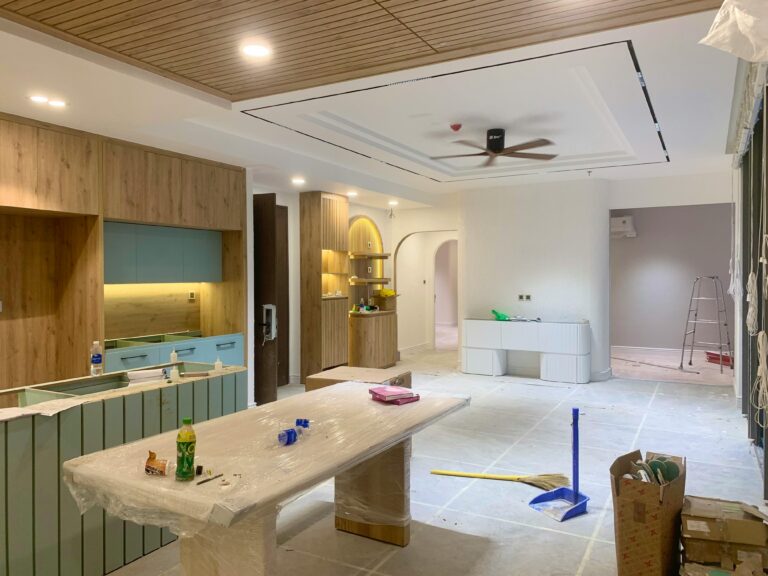Selecting the correct contractor is crucial when it comes to kitchen remodeling. In addition to realizing your vision, a competent contractor will effectively oversee the project, ensuring that it is completed on schedule and within budget. How then do you locate the ideal match for your requirements? Let’s walk through the essential steps to help you choose wisely.
1. Understanding the Importance of a Good Contractor
- Why Hiring the Right Contractor for Your Kitchen Renovation Matters
Consider your kitchen makeover a recipe. The results can be terrible if you do not have the correct components or instructions. Selecting the appropriate contractor is essential to guaranteeing the success of your project. A competent contractor will be able to manage any obstacles that may come up, keeping your project moving forward and your stress levels under control.
- The Risks of Choosing Poorly
Conversely, selecting a bad contractor for your kitchen renovation might result in subpar work, missed deadlines, and exorbitant expenses. It is critical to realize that this goes beyond aesthetics; a subpar contractor has the power to turn your ideal kitchen into a nightmare. Spending time and money and then having regrets is the last thing you want to happen.
2. Defining Your Kitchen Renovation Goals
- Clarifying Your Vision
Take a step back and decide what you want out of your kitchen renovation before choosing a contractor for your kitchen renovation. What do you envision? Which style—cozy and rustic or sleek and modern—is more your style? Think about how your kitchen will serve you and your lifestyle. You can more effectively convey your ideas to possible contractors if you have a clear vision.
- Budget Considerations
A budget’s establishment is equally crucial. Understand your spending limit and your flexibility. Contractors can better understand your needs and provide you with solutions that fit your budget if you are honest about it. Recall that it is preferable to have a clear budget upfront rather than unpleasant surprises later.
3. Researching Potential Contractors
- Online Resources and Reviews
It is time to begin your study now that you have your objectives established. To identify possible contractors in your region, use websites such as Yelp, Angie’s List, and HomeAdvisor. Examine ratings, read reviews, and seek out comments from previous customers. This will give you a good sense of their reputation and reliability.
- Getting Recommendations from Friends and Family
Never undervalue the influence of recommendations from others. Find out from neighbors, relatives, or friends which contractors they have used. Personal referrals can frequently point you in the direction of reputable experts with a solid track record.
4. Checking Credentials and Experience
- Licenses and Insurance
Verify that a candidate has the appropriate insurance and licensing before hiring them. A licensed contractor demonstrates that they have complied with all state requirements and guidelines. Insurance is essential since it shields you from responsibility if there are mishaps or property damage while renovating.
- Experience with Similar Projects
Seek out a contractor who specializes in remodeling kitchens. Every remodeling project is different, so it is a good idea to deal with someone familiar with the particular difficulties associated with kitchen renovation. Inquire about their prior work and any challenges they overcame.
5. Conducting Interviews
(i) Preparing Questions to Ask
Interviews are necessary after you have narrowed down your list of possible contractors. Make a list of inquiries that address their background, project management style, and problem-solving techniques. Here are a few things to think about:
- How long have you been in business?
- Can you provide references from previous clients?
- What’s your process for handling unexpected issues?
(ii) Assessing Communication Skills
Observe the contractor’s communication style during the interview. An effective renovation requires effective communication. You want someone who is transparent about expectations and deadlines, who listens to your ideas, and who offers feedback.
6. Reviewing Portfolios
- What to Look for in a Portfolio
Ask to view the contractor’s prior work portfolio. Examine their designs for consistency and quality. Do their projects have the same aesthetic as yours? Look for overall craftsmanship and attention to detail; these are indicators of a high-quality contractor.
- Evaluating Past Projects
While examining their portfolio, think about getting in touch with previous customers to find out about their experiences. Inquire about the contractor’s work ethic, dependability, and project management skills. This data can provide you with important context on what to anticipate.
7. Getting Estimates
- Importance of Multiple Estimates
Never accept the first estimate you are given. You must obtain many estimates to determine the market pricing for your remodeling. By following this procedure, you will be able to determine what is fair and prevent getting overcharged.
- What Should Be Included in an Estimate?
Make sure estimates are thorough and detailed while reviewing them. Costs for labor, supplies, licenses, and any other necessary expenditures should be included. Estimates that are overly general or omit important details should be avoided since they may subsequently cause unanticipated expenses.
8. Understanding Contracts
- Key Elements of a Good Contractor for Your Kitchen Renovation
After selecting a contractor, be sure to carefully read the terms of the agreement. A strong contract should specify the job to be done, the timetable, the payment schedule, and any warranties. It acts as a legally binding contract to keep you and the contractor safe.
- Red Flags to Watch Out For
Be wary of contracts that have extremely cheap estimations, ambiguous terms, or seem too good to be true. The refusal of a contractor to provide written documentation or to provide an answer to your inquiries is a serious warning sign that should not be disregarded.
9. Evaluating Payment Options
- Typical Payment Structures
Recognize the contractor’s preferred method of payment handling. The majority of respectable contractors will need an initial deposit and ongoing progress payments as the job progresses. Paying the entire sum up front carries some risk in case something goes wrong.
- What to Avoid in Payment Plans
Contractors who only accept cash or who demand significant upfront payments should be avoided. These actions may point to a lack of responsibility or professionalism. It is advisable to continue using well-known payment options that offer some degree of security.
10. Importance of a Timeline
- Establishing Realistic Timelines
Maintaining the timeliness of your renovation depends on careful planning. Create a timetable throughout your conversations that includes important dates and milestones, including the project’s start and finish dates and any crucial stages.
- What Happens If the Timeline Changes?
Be ready for any delays that may occur. Unexpected problems can occur during construction and cause your timeframe to change. A competent contractor will try to minimize interruptions and promptly communicate any changes.
11. Ensuring Good Communication
- Setting Expectations for Updates
Together with your contractor, create a communication strategy. Decide what kind of updates—such as phone calls, emails, or in-person meetings—and how frequently you would like them. This will guarantee that any problems are resolved quickly and keep you informed.
- Tools for Effective Communication
To stay in touch and monitor progress, think about utilizing project management applications or tools. Asana and Trello are two tools that can help keep everyone in order and make sure nothing gets lost.
12. Trusting Your Instincts
- The Role of Gut Feelings
Sometimes, instincts are the only thing to rely on. Trust your instincts if you have any reason to be wary of a contractor, be it their response, communication style, or just a bad feeling. This person will be working directly with you, so it is critical that you feel secure and at ease with your selection.
- Signs You’ve Found the Right Contractor for Your Kitchen Renovation
Indicators that you have found a good fit include quick responses, an eagerness to listen, and a comprehension of your goals. You are headed in the right direction if they appear sincere in their interest in your idea and exude passion.
13. Following Up with References
- Why References Matter
Always request references, then get in touch with them. You can learn a lot about what it is like to work with the contractor by speaking with past clients.
- What to Ask References
Make sure you enquire about references’ experiences in detail while corresponding with them. Ask the contractor about their job quality, communication abilities, dependability, and problem-solving techniques.
14. Considering Post-Project Support
- Warranty and Aftercare
You want to make sure you have some support in case problems develop after your renovation. Find out what kind of aftercare services the contractor provides and about any guarantees on the job completed. A trustworthy contractor will guarantee their work and be reachable for any issues.
- Handling Issues After Completion
Establish a strategy for handling any problems that arise after the project. Recognize what actions to take if something falls short of your expectations. An experienced contractor will be happy to assist you in quickly resolving these issues.
15. Making Your Final Decision
- Comparing Contractor for Your Kitchen Renovation
After gathering all the data, it is time to contrast your top selections. Examine the benefits and drawbacks of each contractor, considering their background, communication style, cost projections, and general comfort level.
- When to Make a Choice
Make your decision after you are comfortable with your choices and have all the information you need! Remember that this choice will have a big impact on your kitchen renovation experience, so trust your instincts and study.
16. Conclusion
It is not easy to choose the right contractor for your kitchen renovation, but if you take the time to read these guidelines, the process will go more smoothly and successfully. You will be well on your way to making your kitchen the center of your house by defining your objectives, doing extensive research, and following your gut.










